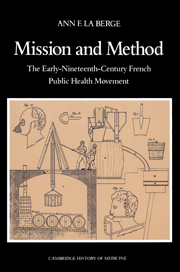Book contents
- Frontmatter
- Contents
- List of tables and illustrations
- Preface
- Acknowledgments
- Introduction
- I Community, method, context
- II Carrying out the mission: Institutionalization, investigation, moralization, and practical reform
- Chapter 4 Institutionalization: The health councils
- Chapter 5 Investigation and moralization: Occupational hygiene and industrialization
- Chapter 6 Investigation and practical reform: Public health in Paris
- Chapter 7 Public health in Paris: Investigation, salubrity, and social welfare
- III Public health before Pasteur
- Epilogue
- Appendixes
- Bibliographical Note
- Index
Chapter 6 - Investigation and practical reform: Public health in Paris
Published online by Cambridge University Press: 17 September 2009
- Frontmatter
- Contents
- List of tables and illustrations
- Preface
- Acknowledgments
- Introduction
- I Community, method, context
- II Carrying out the mission: Institutionalization, investigation, moralization, and practical reform
- Chapter 4 Institutionalization: The health councils
- Chapter 5 Investigation and moralization: Occupational hygiene and industrialization
- Chapter 6 Investigation and practical reform: Public health in Paris
- Chapter 7 Public health in Paris: Investigation, salubrity, and social welfare
- III Public health before Pasteur
- Epilogue
- Appendixes
- Bibliographical Note
- Index
Summary
Investigation was central to the practice of public hygiene in Paris. Acting individually, as health council members, or as appointed members on a municipal commission, hygienists investigated problems referred to them by the municipal government or undertook such studies on their own initiative. Investigations varied in depth and scope, ranging from routine investigations of industrial establishments to studies of national problems such as working-class conditions. Several research methods predominated. Many hygienists employed historical research in archives and official collections, as well as interviews, questionnaires, on-site observations, and statistical data. Some public health problems required experimentation as well. Once the data were gathered, the investigation completed, a report prepared, and a conclusion reached, the investigator(s) proposed one or more solutions, which were sent to the official in charge – usually the prefect of police – who then determined what action to take.
Considering themselves scientific investigators, Parisian hygienists used the city as their laboratory, since it was “well equipped” with many problems and useful tools for investigation. For historical research there were the records of the prefecture of police and the municipal council to be surveyed. Manuscript records of the Paris health council dating from 1802 were available at the Prefecture of Police, and hospitals and the Prefecture of Police both collected statistical data that hygienists routinely used. The most important statistical resource was, however, the Recherches statistiques sur la ville de Paris.
- Type
- Chapter
- Information
- Mission and MethodThe Early Nineteenth-Century French Public Health Movement, pp. 184 - 240Publisher: Cambridge University PressPrint publication year: 1992

